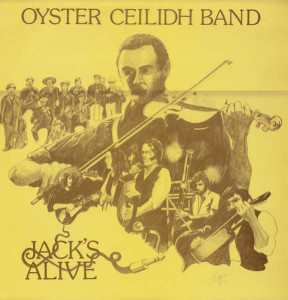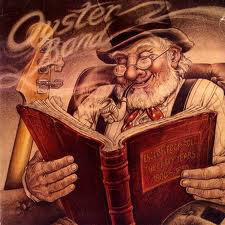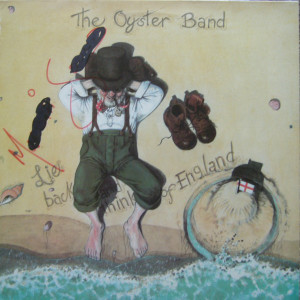Ed Dale wrote this review.
I stumbled onto the Oysterband several years back via a copy of Little Rock to Leipzig, received as a premium during a college radio station’s fund drive. This was blind good luck. The two CDs I had originally wanted were gone, so I picked this one based on its “folk-rock” label. I haven’t stopped listening to this band and now own ten of their CDs. As a devoted and possibly obsessed fan, when the chance came to review some of their earliest and long out-of-print albums, I jumped. I now feel blessed to have acquired this piece of their history. In short, these LPs prove that the Oysters were always good, but have nevertheless gotten much better.
 Who should make the effort to track down these musical fossils? Devotees to English roots/folk rock and die-hard Oyster fans might do well to undertake the search in musty, ale-stained record bins (they were never released as CDs). However, for those newly interested in the Oysters, and they are a frightfully good band, try something more recent: Holy Bandits, Deserters, or one of the live or compilation CDs.
Who should make the effort to track down these musical fossils? Devotees to English roots/folk rock and die-hard Oyster fans might do well to undertake the search in musty, ale-stained record bins (they were never released as CDs). However, for those newly interested in the Oysters, and they are a frightfully good band, try something more recent: Holy Bandits, Deserters, or one of the live or compilation CDs.
The Oysterband began life as “The Whitstable Oyster Co. Ceilidh Band” in 1975, principally a dance band. The name was shortened over the years, eventually shucking even the space between Oyster and Band in the early ’90s. The core of the membership as well as most of the over-all sound and the sensibilities have remained largely constant. The troika of the band throughout the last 25 years has been John Jones (melodeon, piano, lead vocals), Alan Prosser (acoustic/electric guitar, fiddle) and Ian Telfer (fiddle, viola, English concertina).
Jack’s Alive was recorded by the Oyster Ceilidh Band. The folk dance crowd probably loved it in 1980: simple, largely unadorned tunes often with a strong steady (almost plodding) bass. While fiddle and melodeon were and remain staples with the band, here we have bowed psaltery, jaw- harp, bassoon, recorder and crumhorn. There is a bit of electric guitar and synthesizer, but acoustic instruments predominate. Traditional dance tunes, including hornpipes and schottisches, outnumber the songs. Cathy Lesurf provides most of the lead vocals with a very refined and formal soprano. You can almost see precise lines of young English ladies and gents swinging and marching about. The playing is pleasant enough but not inspired.
 The band took a clear turn left in the next two years. English Rock ‘N Roll: the Early Years (1800-1850) was the first album under the shortened name: Oyster Band. John Jones now has taken over the lead vocals for the most part, and songs predominate. The playing is more rocked out; the band more relaxed, clearly comfortable with each other after several years together. As best I can tell, the songs and tunes are all traditional, or at least not very contemporary. Cathy Lesurf still takes the odd lead on “Sons of Freedom,” “Wayfaring Stranger,” and “Bold Wolf.” This is her last album as a band member before becoming lead singer with the Albion Band. “A Longport Hymn” is a tastefully arranged little gem of tune. The Jones/Prosser/Telfer core is rounded out with Chris Taylor on bouzouki, harmonica, bodhran, and guitar, and he stays with the band for 10 years. Ian Kearey (bass, 12-string guitar, epinette, auto-harp) provides a nice tight bottom. He had played with Fiddler’s Dram, an overlapping band in the ’70s, and remained with the Oyster Band until 1989.
The band took a clear turn left in the next two years. English Rock ‘N Roll: the Early Years (1800-1850) was the first album under the shortened name: Oyster Band. John Jones now has taken over the lead vocals for the most part, and songs predominate. The playing is more rocked out; the band more relaxed, clearly comfortable with each other after several years together. As best I can tell, the songs and tunes are all traditional, or at least not very contemporary. Cathy Lesurf still takes the odd lead on “Sons of Freedom,” “Wayfaring Stranger,” and “Bold Wolf.” This is her last album as a band member before becoming lead singer with the Albion Band. “A Longport Hymn” is a tastefully arranged little gem of tune. The Jones/Prosser/Telfer core is rounded out with Chris Taylor on bouzouki, harmonica, bodhran, and guitar, and he stays with the band for 10 years. Ian Kearey (bass, 12-string guitar, epinette, auto-harp) provides a nice tight bottom. He had played with Fiddler’s Dram, an overlapping band in the ’70s, and remained with the Oyster Band until 1989.
 The 1983 release of Lie Back and Think of England finds the same personnel and a bit more electricity. They’ve purchased a few effects pedals for the guitar, wah and distortion. The bass is more to the forefront and is used for melody and counter-melody. There are odd shreds of synthesizer. The sound is in the same general vein as early Fairport Convention. “Gallop Hey,” for example, is a polka that starts out with harmonica and accordion leading and then becomes increasingly faster and twisted with the electrics joining in. John is handling the lead vocals with Ian Kearney and Alan doing harmony. His solo songs are growing stronger here, and he seems to be expanding his range and pathos. The material is still drawn from the folk tradition. There are a few tunes, but songs are taking over. There is even a Cajun waltz/reel combination with some French mutterings in the background. Strong politics has become one of the Oysters’ most enduring and endearing qualities. The contemporary sarcasm and political bent of the band’s future course rears its head here, particularly with the title song, a scathing indictment of blind patriotism. Their working class persuasion is evident on “Stonecutter Boy” and “The Sheepstealer.” Other songs have more standard folk themes, the returning sailor and the wrong person hanged. “Waiting on glory” celebrates music Salvation Army-style
The 1983 release of Lie Back and Think of England finds the same personnel and a bit more electricity. They’ve purchased a few effects pedals for the guitar, wah and distortion. The bass is more to the forefront and is used for melody and counter-melody. There are odd shreds of synthesizer. The sound is in the same general vein as early Fairport Convention. “Gallop Hey,” for example, is a polka that starts out with harmonica and accordion leading and then becomes increasingly faster and twisted with the electrics joining in. John is handling the lead vocals with Ian Kearney and Alan doing harmony. His solo songs are growing stronger here, and he seems to be expanding his range and pathos. The material is still drawn from the folk tradition. There are a few tunes, but songs are taking over. There is even a Cajun waltz/reel combination with some French mutterings in the background. Strong politics has become one of the Oysters’ most enduring and endearing qualities. The contemporary sarcasm and political bent of the band’s future course rears its head here, particularly with the title song, a scathing indictment of blind patriotism. Their working class persuasion is evident on “Stonecutter Boy” and “The Sheepstealer.” Other songs have more standard folk themes, the returning sailor and the wrong person hanged. “Waiting on glory” celebrates music Salvation Army-style
Two years later came Liberty Hall, with even more portents of the band’s future, including songs of insurgency and the glories of living life to its fullest. There is only one ornate instrumental, “St. Peter’s Tea Gardens.” The last vestiges of the Ceilidh are fading. They open with “Arise, arise,” a song of affirmation and rebellion. A few songs celebrate working class outlaws of various stripes: “Banstead Downs,” “Cropper Lads,” and “Steal for Joy.” The curious English folk tradition of recounting horrific injustice is evident in “Bonnie Susie Cleland,” a vague and tragic ditty about a Scots lass who, unwilling to forsake her English man, is burned at the stake by her parents, and “The Breaking of Our Lord’s Birthday,” a gorgeous modal ballad of a father swallowed by the earth for plowing on Christmas. “Euston Station” carries another Oyster theme: a fresh start and confrontation with adversity. This album closes with “Drink, again,” a good-time, skiffle band drinking song, full of debauchery and saxophone.
In sum, these four albums offer insight into the early folk rock idiom and development of one of its stellar proponents. Certainly, they are interesting and enjoyable, but the Oysters’ later work is simply better on every count.
(Dingles, 1980)
(Pukka Records, 1982)
(Pukka Records, 1985)
(Pukka Records, 1983)
